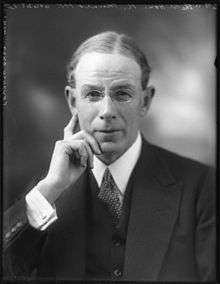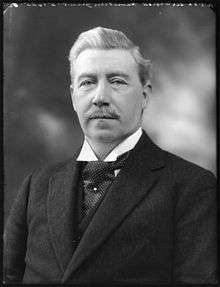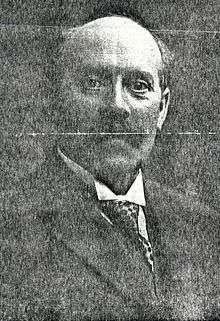Roxburgh and Selkirk (UK Parliament constituency)
Roxburgh and Selkirk was a county constituency of the House of Commons of the Parliament of the United Kingdom (Westminster) from 1918 to 1955. It elected one Member of Parliament (MP) by the first past the post voting system.
| Roxburgh and Selkirk | |
|---|---|
| Former County constituency for the House of Commons | |
| 1918–1955 | |
| Number of members | One |
| Replaced by | Roxburgh, Selkirk & Peebles |
| Created from | Roxburghshire Peebles and Selkirk Hawick Burghs |
Boundaries
The constituency was created by the Representation of the People Act 1918, and first used in the 1918 general election, to cover the counties of Roxburgh and Selkirk.
At least nominally, the counties had been covered previously by the Roxburghshire and Peebles and Selkirk constituencies.
For the 1955 general election, as a result of the First Periodical Review of the Boundary Commission, the Roxburgh and Selkirk constituency was abolished and the Roxburgh, Selkirk and Peebles constituency was created, covering the counties of Roxburgh, Selkirk, and Peebles.
Members of Parliament
| Election | Member | Party | Notes | |
|---|---|---|---|---|
| 1918 | Robert Munro, later Baron Alness | Coalition Liberal | ||
| 1922 | Sir Thomas Henderson | National Liberal | ||
| 1923 | Walter Montagu Douglas Scott, Earl of Dalkeith | Unionist | later Duke of Buccleuch & Queensberry | |
| 1935 | Lord William Montagu Douglas Scott | Unionist | ||
| 1950 | Archie Macdonald | Liberal | ||
| 1951 | Charles Donaldson | Unionist | subsequently MP for Roxburgh, Selkirk & Peebles | |
| 1955 | constituency abolished: see Roxburgh, Selkirk & Peebles | |||
Election results
Election in the 1910s

| Party | Candidate | Votes | % | ± | |
|---|---|---|---|---|---|
| C | Liberal | Robert Munro | 13,043 | 70.1 | n/a |
| Labour | Thomas Hamilton | 5,574 | 29.9 | n/a | |
| Majority | 7,469 | 40.2 | n/a | ||
| Turnout | 22,407 | 55.4 | n/a | ||
| Liberal win (new seat) | |||||
| C indicates candidate endorsed by the coalition government. | |||||
Elections in the 1920s

| Party | Candidate | Votes | % | ± | |
|---|---|---|---|---|---|
| National Liberal | Thomas Henderson | 10,356 | 51.7 | ||
| Liberal | Alfred Hamilton Grant | 9,698 | 48.3 | n/a | |
| Majority | 658 | 3.4 | |||
| Turnout | 20,054 | 60.9 | |||
| National Liberal hold | Swing | n/a | |||
| Party | Candidate | Votes | % | ± | |
|---|---|---|---|---|---|
| Unionist | Walter Scott | 11,258 | 43.1 | n/a | |
| Liberal | Thomas Henderson | 8,046 | 30.8 | n/a | |
| Labour | George Dallas | 6,811 | 26.1 | n/a | |
| Majority | 3,212 | 12.3 | n/a | ||
| Turnout | 26,115 | 78.2 | +17.3 | ||
| Unionist gain from Liberal | Swing | n/a | |||

| Party | Candidate | Votes | % | ± | |
|---|---|---|---|---|---|
| Unionist | Walter Scott | 12,684 | 45.8 | ||
| Liberal | John McIlroy Wylie | 7,737 | 27.9 | ||
| Labour | George Dallas | 7,266 | 26.2 | ||
| Majority | 4,947 | 17.9 | |||
| Turnout | 27,687 | ||||
| Unionist hold | Swing | ||||
| Party | Candidate | Votes | % | ± | |
|---|---|---|---|---|---|
| Unionist | Walter Scott | 13,510 | 38.0 | -7.8 | |
| Liberal | Arthur Robert McDougal | 12,232 | 34.4 | +6.5 | |
| Labour | Robert Gibson | 9,803 | 27.6 | +1.4 | |
| Majority | 1,278 | 3.6 | -14.3 | ||
| Turnout | 35,545 | 78.5 | |||
| Unionist hold | Swing | -7.2 | |||
Elections in the 1930s
| Party | Candidate | Votes | % | ± | |
|---|---|---|---|---|---|
| Unionist | Walter Scott | 21,394 | 55.1 | +17.1 | |
| Liberal | David Edwin Keir | 17,420 | 44.9 | +10.5 | |
| Majority | 3,974 | 10.2 | +6.6 | ||
| Turnout | 38,814 | 84.4 | +5.9 | ||
| Unionist hold | Swing | ||||
| Party | Candidate | Votes | % | ± | |
|---|---|---|---|---|---|
| Unionist | Walter Scott | 18,342 | 50.0 | -5.1 | |
| Liberal | Arthur Robert McDougal | 12,264 | 33.4 | -11.5 | |
| Labour | James Alexander Cuthburt Thomson | 6,099 | 16.6 | n/a | |
| Majority | 6,078 | 16.6 | |||
| Turnout | 36,705 | 78.0 | |||
| Unionist hold | Swing | +3.2 | |||
Elections in the 1940s
A General election was due to take place before the end of 1940, but was postponed due to the Second World War. By 1939, the following candidates had been selected to contest this constituency;
- Unionist Party: William Scott
- Liberal Party: Arthur Robert McDougal
| Party | Candidate | Votes | % | ± | |
|---|---|---|---|---|---|
| Unionist | William Scott | 13,232 | 37.9 | -12.1 | |
| Liberal | Archie Macdonald | 11,604 | 33.2 | -0.2 | |
| Labour | LP Thomas | 10,107 | 28.9 | +12.3 | |
| Majority | 1,628 | 4.7 | |||
| Turnout | 73.7 | ||||
| Unionist hold | Swing | -6.0 | |||
Elections in the 1950s
| Party | Candidate | Votes | % | ± | |
|---|---|---|---|---|---|
| Liberal | Archie Macdonald | 15,347 | 39.4 | +6.2 | |
| Unionist | William Scott | 14,191 | 36.4 | -1.5 | |
| Labour | LP Thomas | 9,413 | 24.2 | -4.7 | |
| Majority | 1,156 | 3.0 | -1.7 | ||
| Turnout | 82.1 | +8.4 | |||
| Liberal gain from Unionist | Swing | +3.9 | |||
| Party | Candidate | Votes | % | ± | |
|---|---|---|---|---|---|
| Unionist | Charles Donaldson | 16,438 | 40.6 | +4.2 | |
| Liberal | Archie Macdonald | 15,609 | 38.6 | -0.8 | |
| Labour | Thomas White | 8,395 | 20.8 | -3.4 | |
| Majority | 829 | 2.0 | 5.0 | ||
| Turnout | 84.9 | +2.8 | |||
| Unionist gain from Liberal | Swing | +2.5 | |||
References
- Whitaker's Almanack, 1920
- The Times, 17 November 1922
- The Times, 8 December 1923
- Oliver & Boyd's Edinburgh Almanack, 1927
- The Times, 1 June 1929
- Whitaker's Almanack, 1934
- Whitaker's Almanack, 1939
Sources
- Craig, F. W. S. (1983) [1969]. British parliamentary election results 1918–1949 (3rd ed.). Chichester: Parliamentary Research Services. ISBN 0-900178-06-X.
- Leigh Rayment's Historical List of MPs – Constituencies beginning with "R" (part 2)